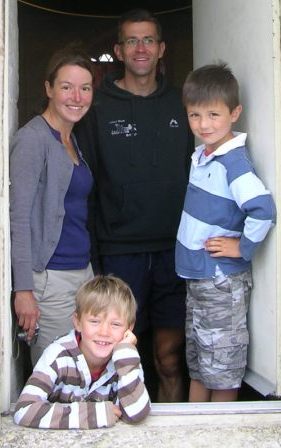Our friend Frances Bryant is an inspiration. She has a deep commitment to her faith; to its implications for the worlds injustices; and to living a life of joy and thankfulness that makes a difference. To her, its important that her two sons Joe (8.5) and Daniel (6.5) also grow up to understand how they can make a difference.
In part 1 of this guest blog, she told us just why she cares so much and explained the impact a Mum can have from her own experiences growing up. In this second installment, she shares various things that her and her husband Mark are trying to do to ensure that loving God, and pursuing justice, again gets passed to the next generation.

Last time I wrote about the impact my Mum had on developing my faith and heart for justice, and how I hope to pass this on to my boys. Mark and I dont have all the answers, but were trying to teach our boys to love God, love others, and be eager to make a difference when they see an injustice or need.
We try to do this in our lifestyles, and considering how our consumer choices affect the worlds poorest communities and our use of resources could help those closer to home. Id like to say its all very well thought through and strategic… but in reality theres a lot more we could do.
At the moment we try to be as green as we can – shop locally, compost, avoid flying and be careful who we bank with. But we hope to grow in this and live more simply. Wanting to walk to work and school informed our house-buying too, and means that we dont use the car too often.
We dont involve the boys in our decision-making on these issues, but they definitely pick up on it. In town recently Joe asked me which is the greediest bank out of all of these? I was quite surprised, and asked him what had given him the idea that banks were greedy? He said, you and Daddy told us, and thats why we bank with Co-op.
When they pick up on things like this, I can explain them on a simple level, so I was able to say that we have a choice over who we bank with, and that we try to find the ones that are the least greedy though of course I cant explain everything about foreign investments and their impact on poor communities!
I once heard someone say that the moment a child can post a penny into a box is when you can start talking about the fact our money is not just for us.
Until the age of seven, children learn by imitation, so what they see you do in their early years has a huge effect. And then when theyre six or seven, you can start talking about things.
Fair Trade has been a brilliant way in eating and talking about chocolate is always popular! We find out about the producers on the packets and these provide the boys with a link with someone somewhere else as well as making a difference.
Recycling is good too in fact theyre very good police generally! Children are quick to notice when youre not consistent. Daniel recently pulled me up for not turning the tap off when cleaning my teeth. It turned out I was just leaving it on a bit too long at the end, but this prompted a delighted Ill show you how to do it mummy! and step by step instructions. He loved it! And of course we saved some water.
Thankfulness and fun must be central. Theres no point chucking all the good things Gods given us back at him but thats not the same as hoarding them for ourselves. Its important that the boys have a good time but also that they share. So weve tried to cultivate an open house which means lots of other people playing with their toys. Lego models get broken and thats hard, but it establishes the value people are more important than things.
Different children respond to different things and its good to go with what catches their unique imaginations. With Joe and Daniel, one of the things that really fascinated them was The Bible Societys appeal for printing bibles in China. The envelope included two pages of the Chinese bible. When they were able to see that Gods word was being produced at a rate of knots for people far away in a language they couldnt understand, they were amazed and excited that all these people were becoming Jesus friends too!
One of their favourite things of all was when I took part in Live below the Line earlier this year a fundraising event where you get sponsored to live on just £5 for 5 days in solidarity with the 1.4 billion people in the world living on less than $1.30 a day. They found it hilarious that I had to eat boring, plain lentils and they could have whatever they wanted! So they asked a lot about that…
At their age, modelling things to them, and involving them directly, are equally important. Recently our church (St Marks, Harrogate) did fundraising for the Eden network. The boys loved washing cars especially with the much cooler teenagers! Suddenly, they were coming up with other fundraising initiatives to organise themselves…
Were feeling our way with it all and learning as we go! We dont have specific plans about how well develop these issues with the boys as they get older. But Mark and I have had the benefit of working with youth groups so we know things like Live below the Line, or having a slightly older role model coming to speak, are especially effective.
But were trying to just do what we can with them now.
Every night we prioritise reading the Bible with them even if we miss out other things. Again, they want us to make that a priority too and so theres an expectation now that I will sit on landing with my Bible too. This helps our focus move outward naturally. They cant not notice the call to love others because the Bible is full of it!
“(There are some really good Bible notes for kids which help them read scripture itself and really grasp its messages. Scripture Unions Tiddly Winks for pre-schoolers, and Snapshots for 7-9s have been great. Now were using CWRs TOPZ which is also brilliant.)
“Sometimes we pray together for particular needs, and we do always try to pray before meals, with other families, before bed, and before long journeys, or meeting up with grandparents. Its a bit of a token gesture at the moment, but Id love it to become integral. We all have to start somewhere!
Here are five easy things to get stuck into whether you have kids or not:
-
I promise I havent been paid to say this, but one of my top tips would be to visit the Sanctuarys website!
-
Perhaps get a calendar from Christian Aid, the New Internationalist, or anywhere which opens up the places and the issues to you and your family through pictures and short snippets info.
-
TV programmes work well for sparking interest too Blue Peter has been great starting point for talking about stuff with the boys because theyre like sponges for facts.
-
Fair trade products are a brilliant way in as I said before!
-
Put up a notice board in the kitchen with photos of people thats something thats worked for us in praying for our God children every meal. But doing this blog has made me think I might put some other things up too. Perhaps the boys could take turns in choosing what well pray for each day…
Lastly, relax, just do what you can, and remember it all needs to be natural, fun, and done out of thankfulness. All children know what injustice is we dont have to put that there. What we need to do is to help develop their wisdom that that unfair feeling they know so well is what it feels like for other people who dont have what they need, or are treated badly by others.

